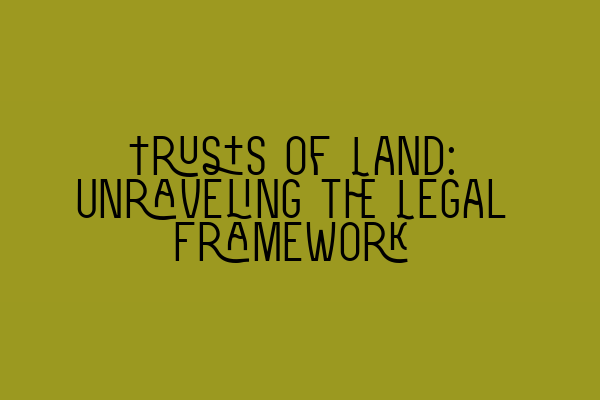Trusts of Land: Unraveling the Legal Framework
Welcome to SQE Property Law & Land Law, the premier solicitors specializing in property and land-related matters. In this blog post, we will delve into the intricate world of trusts of land, exploring their legal framework and shedding light on the complexities involved in this area of law.
But first, let’s define what a trust of land actually is. A trust of land, also known as a TOLATA (Trusts of Land and Appointment of Trustees Act 1996) trust, comes into play when two or more individuals have a shared interest in a property. This could be a family home, an investment property, or any other type of real estate. The trust functions to govern the legal rights and obligations of the parties involved and to establish the terms under which the property is held and managed.
Now that we have a basic understanding of what a trust of land entails, let’s explore the legal framework surrounding this area of law. The main legislation governing trusts of land in England and Wales is the Trusts of Land and Appointment of Trustees Act 1996. This act sets out the law relating to the creation, operation, and termination of trusts of land.
Under the Trusts of Land and Appointment of Trustees Act 1996, the court has broad powers to make orders in relation to trusts of land. These powers include the ability to appoint or remove trustees, vary the terms of the trust, or even sell the property if necessary. It is essential to consult a knowledgeable solicitor who specializes in trusts of land to guide you through the legal intricacies and ensure that your interests are protected.
Now, let’s delve deeper into the key elements of the legal framework surrounding trusts of land. One important factor to consider is the concept of beneficial ownership. Beneficial ownership refers to the right of an individual to enjoy the benefits and profits derived from a property. In the context of a trust of land, the legal owner holds the property on behalf of the beneficiaries who have the right to occupy, use, and enjoy the property. This is an important distinction to understand, as it affects the rights and obligations of all parties involved.
Another crucial element to consider is the appointment and removal of trustees. Trustees play a pivotal role in the administration and management of the trust of land. They have a fiduciary duty to act in the best interests of the beneficiaries and ensure that the terms of the trust are upheld. The court has the power to appoint or remove trustees if necessary, and it is advisable to seek legal advice if you are facing disputes or issues relating to trusteeship.
Additionally, it is vital to understand the concept of trust property and the manner in which it is held. Trust property can consist of both legal and equitable interests in land. The legal interest refers to the title of the property, while the equitable interest refers to the right to enjoy the property. Understanding the distinction between these interests is crucial, as it determines the rights and obligations of the parties involved.
As an SEO expert, we understand the importance of providing you with comprehensive and informative content that meets your needs. If you wish to delve deeper into the topic of trusts of land, we recommend visiting our related articles, which provide further insights and resources to enhance your understanding.
We offer a range of courses and exam preparation resources to assist you in your legal journey. Whether you are preparing for the SQE 1 or SQE 2 exams, our expert tutors are here to guide you through the process and help you achieve success. Please feel free to explore our SQE 1 Practice Exam Questions and SQE 1 Practice Mocks FLK1 FLK2 articles to further enhance your preparation.
For comprehensive preparation courses and information about the SRA SQE exam dates, we invite you to visit our SQE 1 Preparation Courses and SQE 2 Preparation Courses articles. Stay informed and stay ahead with SQE Property Law & Land Law.
In conclusion, trusts of land represent a complex and multifaceted area of law. Understanding the legal framework is crucial for all parties involved in such arrangements. We hope that this blog post has provided you with a solid foundation to navigate the intricacies of trusts of land. Remember, our expert solicitors are here to assist you every step of the way. Contact SQE Property Law & Land Law today for all your property law needs.
